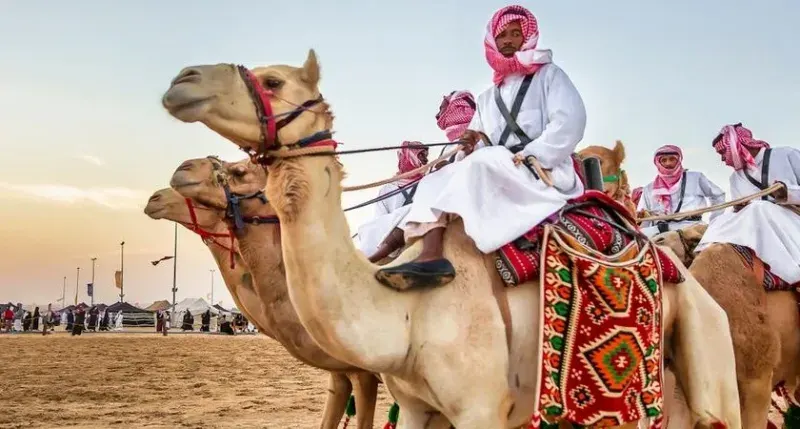Saudi Arabia is a land of deep-rooted traditions, shaped by its Islamic heritage, Bedouin customs, and rapid modernization. As the heart of the Arab and Islamic world, the Kingdom is a fascinating blend of ancient rituals and contemporary influences. From the warmth of its people to the richness of its cuisine, every aspect of Saudi culture reflects a strong connection to its past while embracing the future.
For travelers, understanding Saudi culture is key to appreciating the country's charm. Whether you’re visiting the bustling cities or the vast desert landscapes, here’s everything you need to know about Saudi culture before you go.

1. Hospitality: The Heart of Saudi Culture
Saudi Arabia is known for its legendary hospitality. Guests are treated with the utmost respect, and generosity is a cornerstone of Saudi society. Whether you are invited to a local’s home or simply interacting with people in a marketplace, you’ll notice the warmth and kindness of Saudis.
Arabic Coffee & Dates: Serving guests Arabic coffee (Gahwa) with dates is a centuries-old tradition that symbolizes hospitality and respect. The coffee is lightly spiced with cardamom and often poured from a traditional Dallah (coffee pot).
Majlis Culture: Many homes have a Majlis (a gathering room) where guests are welcomed and offered tea, coffee, and sweets. Conversations in the Majlis can range from family matters to business discussions.
Tipping Culture: While tipping is not mandatory, it is appreciated, especially in restaurants and hotels.
2. Dress Code: Modesty & Tradition
Saudi Arabia follows a modest dress code influenced by Islamic values and cultural norms.
For Men: The traditional attire is the Thobe, a long white robe, often paired with a head covering called the Ghutra or Shemagh, secured by a black cord (Agal).
For Women: Saudi women traditionally wear an Abaya, a long black cloak, and often a headscarf (Hijab). The Niqab (face covering) is also worn by some, but it is a personal choice.
For Tourists: While foreigners are not required to wear traditional clothing, modest dressing is expected. Women should wear loose-fitting clothes covering their shoulders and knees.
3. Language: The Beauty of Arabic
Arabic is the official language of Saudi Arabia, and while English is widely spoken in major cities, learning a few Arabic phrases can enhance your travel experience.
Hello – Marhaban (مرحبا)
Thank you – Shukran (شكرا)
Yes – Na’am (نعم), No – La (لا)
Peace be upon you – As-Salamu Alaikum (السلام عليكم)
Arabic calligraphy is a significant art form in Saudi culture, often seen on mosques, monuments, and traditional décor.
4. Religion & Spirituality
Islam is the foundation of Saudi society, influencing daily life, laws, and traditions. The country is home to the two holiest cities in Islam, Mecca and Madinah, attracting millions of Muslim pilgrims annually.
Daily Prayers: Saudis observe five daily prayers, and businesses may pause operations briefly to allow for prayer time.
Friday as a Holy Day: The weekend in Saudi Arabia is Friday and Saturday, with Friday being the most important day for congregational prayers.
Ramadan & Eid Celebrations: During Ramadan, Muslims fast from sunrise to sunset, and the atmosphere in Saudi Arabia is especially spiritual. Eid Al-Fitr and Eid Al-Adha are celebrated with feasts, family gatherings, and charity.
5. Saudi Cuisine: A Taste of Tradition
Saudi food is a delightful mix of rich flavors and traditional cooking techniques.
Kabsa: The national dish, a fragrant rice dish cooked with spiced meat (chicken, lamb, or camel) and vegetables.
Mutabbaq: A savory stuffed pancake filled with minced meat, onions, and spices.
Jareesh: A porridge-like dish made from crushed wheat, often enjoyed with meat and yogurt.
Dates & Honey: Saudi Arabia is famous for its high-quality dates, often paired with honey for a natural sweet treat.
Mealtimes in Saudi Arabia are social occasions, with large platters of food shared among families and guests.
6. Traditional Arts & Music
Saudi Arabia has a rich artistic heritage, from poetry and storytelling to folk music and dance.
Al-Ardha: The Saudi national dance, performed with swords and drums, is a display of pride and unity.
Poetry & Nabati Verse: Bedouin poetry (Nabati) remains an essential part of Saudi storytelling, passed down through generations.
Calligraphy & Islamic Art: Many mosques and historical sites feature beautiful Arabic calligraphy and geometric patterns.
Today, Saudi Arabia’s creative scene is flourishing with contemporary artists and filmmakers gaining international recognition.
7. Social Etiquette & Customs
Respect for traditions is vital in Saudi society.
Greetings: A handshake is common among men, often followed by a light touch on the shoulder. Among close friends and family, men may exchange cheek kisses. When greeting Saudi women, wait for them to extend a handshake first.
Right Hand Etiquette: Always eat, shake hands, and give gifts with your right hand, as the left hand is considered unclean in Saudi customs.
Public Behavior: Public displays of affection are discouraged, and it’s important to respect local customs and traditions.
8. The Modern Transformation of Saudi Arabia
While Saudi Arabia holds strong to its traditions, it is also undergoing a remarkable transformation. The Vision 2030 initiative, launched by Crown Prince Mohammed bin Salman, aims to diversify the economy, develop tourism, and modernize the country.
Neom: A futuristic smart city being built along the Red Sea.
AlUla: A major cultural and heritage destination featuring ancient Nabatean tombs.
Entertainment & Sports: Saudi Arabia now hosts global events like Formula 1, music festivals, and film screenings, reflecting its growing openness to international visitors.
Final Thoughts
Saudi culture is a fascinating blend of deep-rooted traditions and modern ambitions. From the warmth of its people to the richness of its heritage, Saudi Arabia offers travelers an immersive cultural experience unlike any other.
Understanding and respecting local customs will not only enhance your trip but also open doors to authentic experiences and meaningful connections. Whether you are exploring the historic sites of AlUla, tasting the flavors of Saudi cuisine, or experiencing the energy of Riyadh, Saudi Arabia is a land of discovery waiting to be explored.



